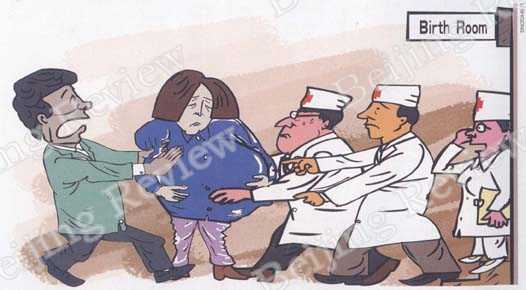Li Liyun, a 22-year-old who was in her ninth month of pregnancy, died of serious pneumonia at Chaoyang Hospital in west Beijing on November 21, after her husband refused to let doctors perform a Caesarean section. The hospital had offered to do the operation free of charge but the husband did not believe it.
The husband, Xiao Zhijun, works at a restaurant with a monthly salary of 700 yuan (about $93). In Beijing, a normal spontaneous delivery in a hospital will cost about 5,000 yuan ($676), while a Caesarean costs about 7,000 yuan ($946). The husband said that they came to hospital to treat a cold, not to deliver the baby. At that time, there was one month of pregnancy left before delivery. He believed the hospital should have let his wife recover from the cold and then give birth without the operation.
In accordance with the Administrative Regulations on Medical Institutions, without permission from patients or their family members when the patients are too ill to express their ideas, doctors are not allowed to conduct operations on them.
Finally, because the best time to conduct the Caesarean operation was missed, both the mother-to-be and her baby in womb died.
Li's death triggered a heated controversy among the media and the public. Some believe the husband is to be blamed for the wife's death and others argue that the hospital should take accountability. There are accusations against the current system that forbids doctors to perform surgery without permission from patients or their family members. It is believed that in as serious a condition as Li Liyun was in, the system should have been more flexible in order to rescue the woman's life.
Life outweighs system barriers
Han Han (The Beijing News): In accordance with the Beijing Municipal Health Bureau, Li Liyun's death can't prove the underdevelopment of laws, that is, Li's death should be blamed on her husband.
However, as details to guide social life, laws must also take into consideration the complicated factors in real life and cover all possible situations. Particularly, when it comes to medical emergencies, "extreme or special" cases should never be excluded from laws and regulations.
Obviously, to ask patients or patients' family members to sign papers before operations, which is stipulated in the Administrative Regulations on Medical Institutions, has loopholes. It overlooks the complicated reality facing different families and grants too much decision-making power to patients' family members.
The original intention to ask the family sign before a surgical operation is to protect patients' rights and interests, but Li Liyun's case shows that the practice is just too rigid to cover emergencies. It is time that relevant clauses in the current Regulations were modified. Meanwhile, in order to prevent hospitals from casually dealing with emergencies, a set of mechanisms to examine the behavior of doctors are necessary.
Yang Tao (www.hebei.com.cn): It is to ensure patient's and their families have the right to know and to define the rights and obligations on both sides that relevant regulations say that doctors have to get consent before an operation. Nevertheless, in practice, this regulation is quite questionable. While in most cases, family members will follow suggestions of doctors, in some cases, they do not agree with doctors and then the best chance to save a dying person is missed. In some extreme cases, family members even deliberately want the patient to die. Usually, doctors know much better about the situation than family members do, so in cases when an emergency operation is needed but family members do not agree, the laws must give doctors the right to act.

Since laws have made it possible for family members to decide whether a patient can be operated on or not, then they must be made to shoulder certain responsibilities. Isn't it necessary to punish the decision makers if they insist on not taking emergency treatment after being informed of the dangerous situation or deliberately refuse the treatment? If so, family members will act more cautiously when endorsing medical treatment by hospitals.
Shao Jian (Modern Express): It is a common practice to ask family members to sign before a surgical operation' is carried out, but this is a contract within the health sector, not an administrative stipulation. As for this contract, its rationality is still a problem, especially when it's a matter of life and death. In essence, this contract is a measure for the hospitals to protect their own interests.
In common cases, the consent of patients' family members can shield hospitals from possible disputes. However, when it comes to an emergency, if medical workers choose to follow this principle without respect to life, they are actually breaching professional ethics.
Hospitals should always treat life as more important than anything else. When a person is at critical condition, what matters to doctors should be life, and at such a critical moment, even if without the consent of family members, they are supposed to conduct the necessary operation.
Gao Yongfeng (Yanzhao Evening News): It's ridiculous if hospitals value the non-violation of laws and regulations more than a patient's life. Actually some detailed regulations in the health system have become a time bomb and the occurrence of more Li Liyun-like tragedies is only a matter of time.
In line with relevant health regulations, no matter how simple a medical treatment is, as long as it may harm patients, the hospital has to ask patients or their family members for permission. This regulation will always put the hospital at an advantageous position in case of any medical malpractice dispute.
Hospital regulations and systems need to be respected and further improved, but it is also important for hospitals to act in a more flexible way when emergencies do occur. The system is not supposed to outweigh a citizen's right of enjoying life.
Hospitals should not have too much power
Wang Lin (Guangzhou Daily): According to the Administrative Regulations on Medical Institutions, when a surgical operation is to be performed, doctors must have permission from the patient or his/her family members. From the legal point of view, the hospital should not to be blamed for Li Liyun's death. To conduct an operation is a risk at all times, so if doctors insist on doing it regardless of the patient or the family' s opinions, how is the unexpected occurrence to be handled?
Some people may argue that hospitals should be exempted from punishment if the operation is conducted to save a patient's life. The problem is how can we tell that the operation is done for the purpose of saving life, instead of economic benefits? If hospitals are given the decisive right of conducting an operation, then no one can guarantee that some profit-centered hospitals would not decide to conduct a Caesarean on every pregnant woman in order to make more money.
Whether to receive an operation or not is a patient's right and this is confirmed by current laws. Only when the patient is too ill to express his/her ideas clearly will this right be transferred to the family members. Besides, who can be certain that if hospitals have the right to decide, a tragedy like that of Li Liyun will not happen again?
Yang Zhizhu (New Express): Just as law-savvy lawyers are not allowed to freely deal with their clients' properties, doctors can't force patients to have an operation because they are more medically capable than the patients. Otherwise, knowledge and science will become a murderer.
Actually, whether an operation will succeed or not depends on the surgeons' ability to deal with the situation, not on permission from patients or the family members.
When a patient is too ill to express his/her ideas and the family members are absent, the hospital is entitled to conduct proper management in the patient's interests. In principle, proper management can't be conducted against the patient' s will, but when the patient is thinking of something unacceptable, say, killing himself, doctors can go against that person's will, let alone the family's requirements.
In this sense, doctors at Chaoyang Hospital should have saved Li Liyun's life as this will ensure her basic right of survival. However, proper management is not compulsory.
Zhuo Xiaoqin (Procuratorial Daily): It is a common practice that hospitals should always put the life of their patients first and when emergencies occur, to save a patient's life is the most important thing. However, in these cases, to some extent, the right to know seems a more important principle. Since a medical operation may well do harm to a person, it is necessary for patients and their family members to know about the situation. If the action is taken without consent, this is already a violation of the patients' rights.
In the case of Li Liyun, too much attention has been paid to the husband's refusal to have his wife operated on and many believe that the hospital's inaction is the major reason for her death. Actually, this presumption is misleading the public.
The relationship between patients and hospitals should be a harmonious one based on mutual trust. However, in the current market economic environment, this ideal situation is no longer true. The key is that patients and hospitals may conflict with each other because of respective interests. In this case, laws must play a role in restricting hospitals from taking actions that may hurt patients' interests, that is, patients must have the final say on their own cases.
Therefore, we don't like to see hospitals have the right to impose operations or certain treatments on patients. Loosened controls in this regard might seem effective ostensibly, but fundamentally they threaten the patients' basic rights and interests.
Dear Readers,
"Forum" is a column that provides a space for varying perspectives on contemporary Chinese society. In each issue, "Forum" will announce the topic for an upcoming issue. We invite you to submit personal viewpoints (in either English or Chinese).
Upcoming Topic: Are we really helpless in the fight against sex bribes due to the absence of a legal definition for this crime?
E-mail us at byao@cipg.org.cn
Please provide your name, telephone number, zip code and address along with your comments.
Editor: Yao Bin


 Copy Reference
Copy Reference